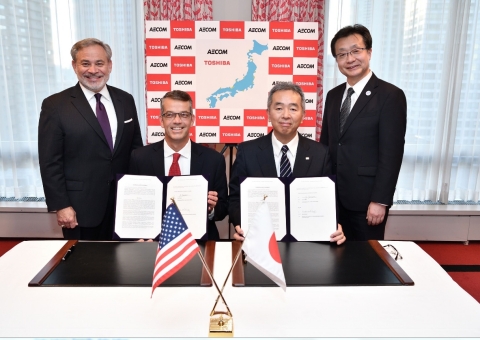AECOM and Toshiba extend decommissioning services; Scotland urged to consider new nuclear reactors
Our pick of the latest nuclear power news you need to know.

AECOM and Toshiba extend decommissioning services
U.S.-based AECOM and Japan's Toshiba Energy Systems & Solutions Corporation are to extend their decommissioning services to nuclear plants in Japan. They have been working together since 2014.
The new agreement will see the two companies collaborate on setting up their organizations and promoting joint services to utility owners in Japan.
Toshiba ESS has played a key role in the construction and decommissioning of nuclear power plants in Japan. AECOM provides services for the decontamination and decommissioning of nuclear power plants and reactor units around the world.
Yanase Goro, chief nuclear officer at Toshiba ESS, said there are 24 commercial reactors in Japan that are to be decommissioned or are under consideration for decommissioning.
AECOM Chairman and CEO Michael Burke said, "We believe this alliance has the right experience, capabilities, skill mix and resources to meet the needs of this nuclear clean-up market.”
Scotland urged to consider new nuclear power stations
An inquiry by the Royal Society of Edinburgh says Scotland should consider new nuclear power stations to meet its climate goals.
The country aims to have net zero emissions by 2045 and wind farms and hydrogen are also low-carbon solutions, said the inquiry.
Scotland’s two nuclear power stations, at Hunterston and Torness are due to close by 2030 and produced 37% of the country’s electricity in 2017.
Deputy chair of the inquiry, Professor Becky Lunn, said electricity production may have to increase fourfold in Scotland as it moves towards carbon reductions.
“We have got difficult decisions to make and if we delay we will end up importing by default, which is not a place where in future I think we would wish to be,” said Lunn. “We need to change. At the moment we have a totally unsustainable system.”
SK Telecom develops 5G smart tech for Korea Hydro & Nuclear Power
Telecommunications company SK Telecom will collaborate with energy company Korea Hydro & Nuclear power on smart power plant solutions based on the new 5G network.
The initiative aims to increase energy production efficiency and improve on and offline security.
SK Telecom’s Digital twin technology will be implemented to create a virtual clone of existing software for use in simulation to check on asset condition, productivity and activation scenarios. This will allow real-time monitoring to optimize operations.
The two companies also intend to develop solutions for new energy technologies for global export.
Nuclear Energy Insider
